Vidya Shankar's Blog
March 1, 2022
This is News Too
The move comes following the death of a critically endangered Cuban crocodile inside Madras Crocodile Bank Trust allegedly due to high-decibel noise coming from a nearby hotel.’
The New Indian Express, Chennai, 07 April, 2019
(In 2019, a critically endangered female Cuban crocodile died inside Madras Crocodile Bank Trust allegedly due to high-decibel noise coming from a nearby five-star hotel. This crocodile was part of a critical breeding group of one male and four (now three) females.)
The thirtieth night of March 2019
All quiet at the eight and a half acres CrocBank
The inhabitant reptiles and amphibians
having been fed for the night,
Romulus, the “Snake Man”and his staff
retiring themselves to the restful confines of a tranquil night When, quite unannounced, a heavy sound-quake
rocked them.
A high profile party in the adjacent resort, a luxury hangoutAll of stars five for hospitality and personalised serviceHad called for bass music, an accompaniment to hard liquor—
The more the revelry in the spirited jamboreeThe higher the decibelsToxicity having dampened
Eardrums.
While rock flowed on rock
And the rocking spree built its momentumIn the neighbouring quietude, there began a rolling…
The crocodiles and the snakes pounded and slitheredThe aggravated aggression and terrifying tantrums
Distressing the frightened caretakers to concerned confusion!
Pathetic pleas and repeated requests for volume reduction
Fell on busted ears After all, it was not the CrocBank that gave the resort staff their salariesAnd so, fidelity to their guestsThe moneyed clientele They kept the hi-fidelity speakers blaring through the night
The morning that followed dawned upon a wasted scene ―
While an alcoholic delirium hung over the five-starred resortIn CrocBank, it was a state of mourning!
A healthy Cuban crocodile, its species having prime position
On the World Conservation Union Critically Endangered species list
had died: a female of a critical breeding group
Of one male and four females… now three.
When news of the tragedy reached the ears
Of the night’s revellers, all that was said
Devoid of any remorse was:
‘It was only one that died, there’s three anyway
That’s left.’
Footnotes:
Romulus, the “Snake Man”: Romulus Whitaker, the “Snake Man” of India and a Padma Shri awardee is the founder of CrocBank, or The Madras Crocodile Bank Trust/Centre for Herpetology.
Disclaimer: The comment of the “night’s revellers” at the end of the poem is fictitious, but purposefully included to show the callous and apathetic attitude of most people towards animals, especially towards those animals that are not part of one’s domestic environment.www.facebook.com
July 8, 2021
Name Me Right
The grand-elders of the family agreed upon for me,
A name as per the astrological charts confirmed.
‘Twas a wonderful name, no doubt,
A name that held serene beauty,
But what my mother wanted for her first-born
was something beyond the aesthetics.
All through her trimesters, she had only prayed
that her daughter (yes, she knew it would be me)
be blessed with knowledge and wisdom,
Not just of the intellect but even beyond.
My mother, however, being nothing but
that breed of a daughter-in-law
conditioned to mute nodding whenever
the grand-elders pronounced an edict,
The prayer was a silent wish she carried
into the labour room —
My mother, whose name spelt ‘victorious’.
So, when the unheard voice managed in a whisper
To utter the wishful name,
The grand-elders deemed it sacrilege.
“Remember, it’s a girl you have birthed,
Society expects a girl to be beautiful, not wise.”
“Remember, it’s a girl you have birthed,
who must, one day, cross our threshold to move
into her husband’s home.
A girl with brains is a girl undone.”
“Remember,” said a stern-eyed matriarch,
“Men take beauty; men don’t take intellect.”
“Remember what you are now.
For the name your parents gave you,
What are you but a meekling here!”
Thus, the cry of the meekling ignored,
An absolutistic statement was made —
“Beauty, the baby’s name will be,
Beauty, she will grow up to be,
And beauty, her tool, a husband for her to find.”
What brought about the moment of catharsis
Neither of my parents can recall,
But just as the priest was about to declare
the commanded name,
My father, a shadow till then, spoke out loud and clear.
“She’s my daughter and I shall name her what I will.
I refuse to comply
With your unreasonable decree.”
People say it was my father’s audacity
To make his voice heard in a tone more solid than the elders’
that gave me my name.
But I believe ‘twas Love —
The love my father had for my mother
That triggered his voice.
And, over the hollering of generations of bias
Came victorious, a mother’s silent love
That dared to dream for her daughter
Not only a simple name but also a destiny
That went beyond
The acceptable.
www.facebook.com
June 16, 2021
A Toast to the New Year
Bling bashes, jamboree glows
Night-long indulgences, countdown craziness
The extravagant welcoming of a new year —
What are we celebrating?
A sham!
One year —
The growth, the experience, the journey of a year lived.
Yay yay the celebration!
Twelve months —
Our blessed self of the twelfth,
Not the same entity that entered the year in the first.
Oh! Doesn’t that call for merrymaking!
Weeks, all fifty two of them,
The hits and misses, highs and lows,
Gains and losses, births and deaths,
To all this… a toast!
Three hundreds, five and sixty days,
Each a unique one as each night fell,
Survived the vibrant, the placid,
The agonising, the bad-haired one,
The ones we faced with strength,
The ones that strengthened us,
Rounds of celebratory cheers to all that!
But most importantly, close as this year is to an end,
Is there brought to a closure
The pain, the grief, the dismal, the defeats,
The partings, the bitings, the silences, the sharpness,
The unforgivable stories narrated thro’ this year?
If yes be the answer that the heart says, then,
Jive into a celebration like none other, for,
The fairy dust of forgiveness will emit sparklers of joy,
Peace will flow like abundant wine,
Love will satiate your hungry belly,
And heartfelt good tidings will light up cheery smiles.
This, my dear, is the party you should be in,
This, my dear, is how you must toast the new year in!
— Vidya Shankar (Dec 31, 2018)
www.facebook.com
May 30, 2021
Panchajanya
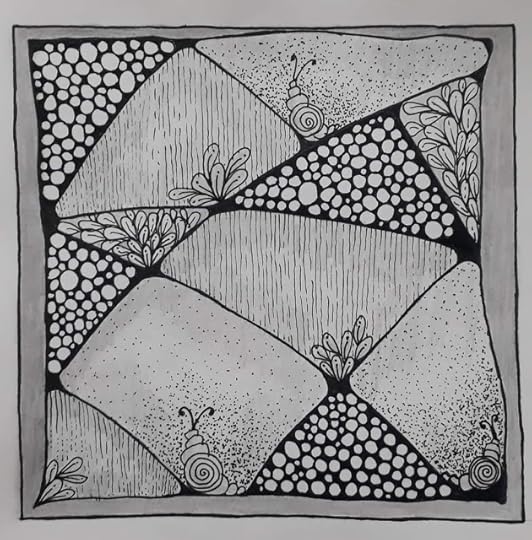
Wishing to feel free from the claustrophobic lockdown
I went for a meditative, zen stroll in the rock garden
I had constructed in my little backyard
But a recent shower, though welcoming
Had made the rounded stones un-walkable for me
Not that they were slippery
But the feel of wetness on my soles —Unrelished!
My eye engaged with the gravelly sand—
The patterns of beautiful, circular rivulets
I had so carefully raked to a ripple
Dishevelled! Walked I along the meandering pathwaysMy azaleas and woodland primroses to surveyThe rain made them look fresherBut had brought in repulsive creepies too
There, on the stalk of my young clematis
Moving as if in no hurry was a mollusc
‘Cheee!’ As I aimed to repel it with sprayThe garden seemed to rockThe snail vanished and in its stead
Emerged the resplendent supreme form
Of my Lord Krishna!
Beheld Him I with stupefied wonder
For, smiling at me from His left hand
The snail I was about to terminate—
The shanka? The Panchajanya?
The shock intensified as one by one
Of Krishna’s symbols revealed themselves to me—
His skin, the blue of the skies
Peethambara dhari, adorning the yellow of golden harvest
His Vanamali, earth’s flora; His mayur, earth’s fauna
Red His lips, the richness of fruits
His Murali, a breath of fresh air
Keshava, His hair, the waves of the surging ocean
And His Chakra, the Su-Darshana
Auspicious sight —
Of the wind and the rain
Of the sun and the moon
Of the soil and its creatures
Of the planets and the galaxies
And in the middle of all this extravaganza
A surrealistic miniscule — Me!
A paltry dot
In the astronomical scheme of the Universe!
All I can do is create, in my backyard
A nanoscopic representation of this enormity
A few moment of respite to snatchFrom life’s ever-hurried momentum
Brought on me
By me!
My brazen stupidity embarrassed meI blinked. The vision was gone
The snail was on the stalk of my young clematisI could not harm it nowI walked away
Welcoming the wetness of the rounded stones
Appreciating the gravelly sandNot disrupted as a human would
But beautifully dis-arrangedOnly as Nature can.
Panchajanya, the sacred conch, is one of the attributes of Krishna. The shell of a sea snail, Panchajanya, when blown, emits a deep, vibrant sound that is resonant of ‘Om’.
Zen gardens or Japanese rock gardens are dry, miniature landscapes created to aid meditation. One of the features of a zen garden is an arrangement of sand or gravel which is carefully raked to form circles or ripples. Zen walking is walking barefooted.
Peethambara dhari is Krishna, the One who wears (dhari) garments (ambara) of yellow (pita)
Vanamali, the One who wears a garland of forest flowers, indicating Krishna
Mayur is the peacock feather Krishna dons on His hair
Murali, the bamboo reed or flute that Krishna plays music from
Keshava is Krishna so called because of His long, beautiful hair (kesh)
Chakra, the Su-Darshana, or the Sudarshan Chakra is another of Krishna’s attributes. Su-Darshana literally means “auspicious vision”. This Chakra (wheel) is a spinning weapon having serrated edges meant to cut off egoistic heads. Which leads to “auspicious vision”.
www.facebook.com
February 3, 2021
Colours of Fall
She smiled to herself as she recollected her conversation she had had with her father earlier that day.
***************
‘Appa, I have joined an art class. Very soon, I’ll be making all the beautiful paintings I have always desired to paint.’
‘Art class? At your age?’
It was as if her second sentence was unsaid, and the excitement that quivered in her voice was non-existent. But it didn’t surprise her at all that her father only focussed on her first sentence. She had expected this reaction from him. After all, what else could one expect from someone who had given up on life decades ago and was expecting a death that didn’t seem to have any intentions of visiting him!
Her father. The only one left of four parents that she and her husband shared. She wanted him to know, and irrespective of what he said, just his knowing was blessing enough for her. Vanaja didn’t find it irritating; she was beyond all that now. She had better things to focus her energy on than losing it over meaningless irritations, be it her father’s negative attitude or the world at large. Moreover, she loved her father dearly.
Her father. Winter had come upon him unannounced when his wife died all of a sudden. Maybe, she too didn’t want to leave him. And her children. It was as if she hadn’t lived life fully. But her sojourn on this planet—in her physical role as Vanaja’s mother, as her father’s wife, as someone’s daughter or daughter-in-law, as someone’s friend — was over and she had to move on. Her father knew that, and had eventually come to terms with it too, or so it seemed, because he had soon resumed his daily activities. Yet, Vanaja felt he never did pick up his life again. It was twenty years now, and he still went through each day with just one thought, one desire. To be reunited with his wife.
Living with that one prayer, he became winter—cold, pessimistic, irritable, unreasonable, uninspired. A far cry from his usual encouraging self. Vanaja was surprised at how he had transformed physically too. From a man of handsome features and stature that made heads turn and look at him again, he had, quite too soon, shrunk to a shadow, a wizened old man with white hair and white flowing beard.
‘Yes, Appa, art class. The art teacher takes classes for adults too’
‘Adults must mean someone in their thirties, not fifty, like you.’
Vanaja smiled at the typicality of her father. Of course, her father couldn’t see her smiling. He didn’t have a smart phone with which they could video call. It didn’t make a difference anyway; he wouldn’t have understood her smile.
‘No, Appa, she does. In fact, some of her adult students are as old as sixty and seventy. Even you could learn art from her if you wanted.’
‘Me? What will I do with art lessons? I am almost eighty, and at my age, every day is a step towards the grave. Those old people must be out of their minds. And you are foolish to get into this at your age. I am sure these are not free classes. You will have to pay for them. And the cost of art materials! What is the need for these classes now? You may not be old as yet, but you are not young anymore. For how many more years do you think you can go to work and earn? Shouldn’t you be saving for your old age? As it is, you are just out of an unfortunate crisis that’s drained you of your bank balance. Or, is this another way to make money? By selling your paintings? If that’s the case, then it makes sense.’
Vanaja winced at the reference to the “unfortunate crisis” that had drained her husband and her not only of their bank balance but also their peace of mind, social respect, and to an extent, their health too. It was like a long-drawn-out summer when sweltering heat and rising temperatures affect mental patterns, lead to fatigue, and nothing seems to happen except the escalation of discomfort with just no relief from the onslaught.
But Vanaja and her husband were a pair of warriors, never giving up, rising every time they went down until the “unfortunate crisis” was a thing of the past. It definitely was not easy, they made errors of judgment, they often slipped and faltered, but they also learnt a lot of life lessons along the way.
It was a couple of years now since temperatures had begun to cool, and Vanaja was thankful for the autumn that was setting in. The black and white family drama of summer was gradually getting grey overtones and though Vanaja was grateful for the changes, she felt their life could do with some colour now. Their years of summer had taught them not to look for colour from outside but to bring out the hues and shades within them to light.
‘Appa, I am not going to learn art for selling purposes, at least not now. I am going to learn art for the sheer joy of learning, for the joy of fulfilling a wish that I have, for long, been nurturing. Don’t you remember how, as a young girl, I used to finish off all the art supplies that you had to buy me for school? Don’t you remember how you would take me to art competitions and I would cry because all I got were participation certificates, and maybe an occasional consolation prize, but you would be so proud of me, nevertheless? Do you know why I got only participation certificates? Because the prize winners went for art classes or had someone to guide them with their art. Both you and mother, you encouraged me, but you didn’t know the nuances and techniques of art to guide me. I had, since those school days, wanted to go for art classes, Appa.’
‘Your mother wished so much to send you for art classes, but we just couldn’t afford it then. The most we could do was not compromise on your basic education. We could just about manage to send you to a good school. By the time we could afford, you had grown up, and life was scheduled with board exams, university, and marriage, one after the other.’
‘I know, Appa. I am not blaming you for anything. All I am saying is what I couldn’t do earlier, I am doing now. You spoke of life schedules. Sometimes life does get into a pattern and we find ourselves unable to avoid the schedules. But, should life always go by a schedule? Why can’t one do things out of pattern? Look at mother. Was that an age to die? If everything had to go by schedules, then she shouldn’t have died when she did, at fifty-five. In five years from now, I will have reached that age, Appa.’
‘Did you know that about two-three years before she died, your mother had asked me if she could take up music lessons once again?’
Vanaja didn’t know. What was her father saying? That must have been soon after her daughter was born.
‘You knew she was a trained Carnatic singer, didn’t you?’ asked her father.
Vanaja knew, or rather, she had come to know about her mother’s dormant music talent only after she herself was married and had had her child. In fact, it was her baby daughter who had brought the story out.
Vanaja had gone to her parents’ for her delivery. One day, after the baby was born, Vanaja was having an unexpected episode of anxiety and her cheerless mood was affecting her baby. When the baby just wouldn’t be consoled and Vanaja’s distress was shooting up, her mother took her granddaughter in her arms and sang. It was the first time Vanaja had heard her mother sing. Vanaja could make out that it was no ordinary singing; though her mother’s voice cracked a bit, Vanaja could make out the nuances that could come only from proper, indepth training. When the song was done and her sleeping baby was gently laid in her cradle, Vanaja demanded she be told the story behind her mother’s hidden talent.
Her mother had grown up listening to her grandfather who, though not a legend, was still a well known Carnatic singer of his times. Sadly, none of his children or grandchildren, except for Vanaja’s mother, inherited his passion for music. Vanaja’s mother learnt all she could from her grandfather, and after he died, continued her music education under the tutelage of another guru. When she got married, her parents-in-law not only put a stop to her music lessons but also forbade her to sing anymore. She was told that married women who took to music neglected their duty by their husbands. Being a gentle and meek girl, Vanaja’s mother acceded. Since no one else in the family was interested in music, nobody gave much thought about this talent being buried. Which was why Vanaja never got to hear about this from anyone.
But now that she knew, she was enraged. What a cruel thing to do, she exclaimed. The past is past, she declared, but it’s never too late to start afresh. She pleaded with her mother to join a music class. Her mother smiled and sang another song for her granddaughter. Halfway through the song, she choked and stopped. Vanaja thought she was crying but her mother was smiling shyly, shaking her head and saying that her shortness of breath wasn’t allowing her to sing. Vanaja’s mother often suffered from severe bouts of asthma attacks, so Vanaja didn’t exhort her mother again after that.
‘Mother had asked you if she could take up music lessons once again?’ a surprised Vanaja questioned her father. ‘And what did you tell her?’
‘I said that people would laugh at her if she went for music lessons at her age. But two days later, I felt I had disappointed her and told her to look for a teacher who would be willing to teach her. She responded with her usual smile and convinced me that she was not too keen about the idea and had merely asked. She said that singing was beyond her now because of her asthma and I believed her. But now I realise that she didn’t want me to be hurt, so she smothered her desire to get back to her music.’
Her father went silent for a minute and Vanaja too didn’t know what to say.
‘Vanaja. I now feel that your mother’s asthma was not some illness. It was all her music trying to come out, but the more she kept suppressing her songs, the severe her condition became. She took that one last chance but I put a lid on it. Vanaja, your mother didn’t die of asthma; I killed her.’
Her father wasn’t crying but she could hear his heart ripping to pieces. She wished she had been close by. She wanted to give him a hug and alleviate his pain. But they were miles apart and all she could do then was console him over the phone.
‘Appa, please don’t be hard on yourself. None of us knew what we were doing—not you, not me, not mother.’
‘Yes, none of us knew then. But now I know, yet I am repeating the same story all over again. I am sorry, Vanaja, if I had sounded discouraging when you told me about your art class. Please forgive this old man with his old habits. Go, enjoy your art classes. My blessings are always with you.’
***************
The jasmine tea was calming. She walked up to her desk, put the empty mug upon it and looked at the jars of colours. She knew where she had found them. They were the colours of her fall. Then she picked up her brushes and held them against her cheeks—the brushes with which she was going to paint her autumn in vibrant colours. And when winter came upon her, she knew it would be a season of bliss. There was so much to love about life.
www.facebook.com
January 15, 2021
Thiruppavai series 2020, Day 22 of Margazhi
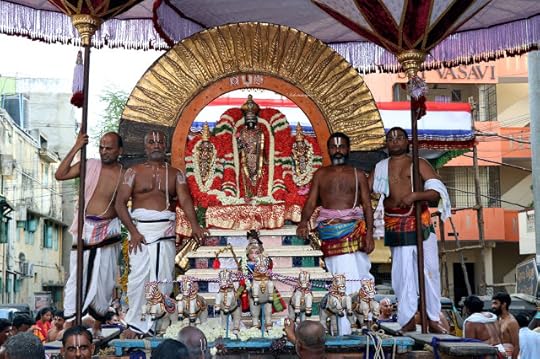
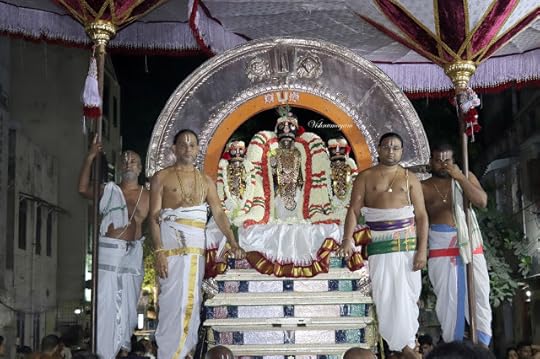
MAYA
All was still and silent yet again, and this time too, the quietude was because of disbelief. But this disbelief was an entirely different emotion, so much in contrast to the incredulity Kothai and all of us Thozhis had felt when we had first walked into the sanctum expecting Krishna to be waiting for us with open arms.
Our journey from the first disbelief to this second one, though only a few minutes, seemed to have taken a lifetime — a lifetime of ego-shedding and letting go of expectations. And, much as we even now couldn’t believe it, there we were, standing by the Lotus Feet of our Lord Narayana, in close proximity to our beloved Krishna as He lay in blissful yoga nidra, the state of conscious-sleep.
I looked at Kothai. She stood unmoving, her eyes intently fixed on the supine Form of Lord Ranganatha. But her hand was upon her heart.
“O hush, dear heart, you beat too loudly,
You might startle Perumal into wakefulness.
It is our good fortune that we stand here beside His Feet,
As a blessed one once stood,
Waiting for Padmanabha to wake up.
Ah, what a vantage position to be in,
As only the Arjunas know,
To delight in the charm of those Eyes
When they open from sleep,
Like a lotus at the break of dawn
Blooming with lingering deliberation,
Making you, my heart, flutter with even greater vibrancy
Than you do now.
Those Eyes, so full of compassion and love,
And the source of all light,
It would seem to us when you open them, O Kanna,
As if the sun and moon chose to rise together.
O Paavai pengale,
Oh, to think that Krishna,
Even in His ‘slumber’ state,
Envisions only the best for His devotees!
O Thozhis, as I stand here with all of you,
Awaiting that miraculous moment,
All I can ever wonder about is
Would we have been so blessed
Had Govinda been waiting for our arrival with open arms,
A gratification of our meanest desires?”
O Kothai, what a marvellous learning journey this has been so far, a lesson in unquestioned surrender! Standing here, I understand what liberation truly is, what happiness genuinely is. Nothing can be more precious than this association with our Mukunda. And instead of making that our life’s quest, we go after temporary joys, deluded by the tricky Maya.
“Maya! Ah! How human life is ensnared by her.
Oh Narayana! Pray I do for the Duryodhanas of this world
Who are attached deeply to Maya
And her enticements of power and position.
Oh Govinda! Pray I do for the Duryodhanas of this world
Who believe that serving the Feet is below their dignity.
O Madhava! Pray I do for the Duryodhanas of this world
Who live in the delusion that Krishna’s Narayani sena
Is more powerful than Krishna Himself,
All because they can assess strength only by physical stature.
O my Lord Parthasarathy, until You brought us here, by Your Feet,
We were hazed in delusion.
Nothing but our past sins
Could have deprived us of the understanding
To perceive Your majestic immensity,
Nay, not the understanding
To perceive Your majestic immensity
But to be deprived of Your majestic immensity itself…
Our greatest sin is separation from You, O Krishna!”
And not wanting to be separated from our Mukunda any more, we stood there patiently, waiting for the Divine Eyes to bloom, in His own time.
Photographs and video courtesy: Shankar Ramakrishnan
For more such photos, please check Facebook Page: VISHNUMAYAM
Please note: This is NOT a translation of the divine verses sung by the revered poet-saint Andal. I have not the qualifications for that undertaking, my greatest limitation being my inability to read and write Tamil. Nor can I claim to be as devoted and as passionate as Andal was to Her Rangamannar. But I do love Krishna in my own way and these verses are just my attempt at writing a poem a day, as Kothai did over the thirty days of Margazhi, centuries ago. The muse for each of these thirty verses are the thirty songs that form the thirty paasurams of Thiruppavai. As I can't read or write Tamil, I have had to look up the Internet for translations and transliterations of Thiruppavai. I have provided the links below. Also for the same reason is why my poetry is in English.
I offer this humble work at the Lotus Feet of my Lord Parthasarathy, my Krishna, my Flautist of Brindaranyam.
Click here for Thiruppavai series 2020, Day 21 of Margazhi
www.facebook.com
January 10, 2021
Thiruppavai series 2020, Day 21 of Margazhi: 05 January 2021
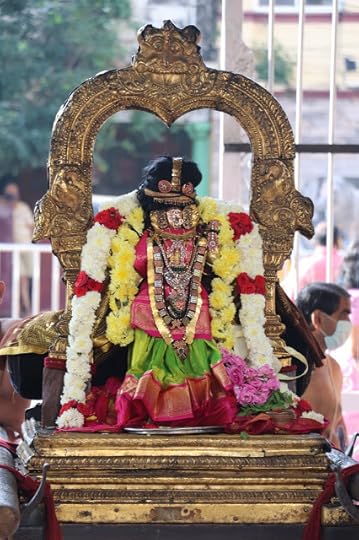
THE SISHYA, THE TRADITION
“Ah! What blessing is mine
This fortunate scene, a witness I could be!
Nothing but the grace of my Guru, my Guru Parampara,
The Guru Tattva which guides and protects me
Could have taken me
To that alcove, wherefrom I could see unfolding
The divine symphony of Kothai’s supplication.
But the saga is not over yet,
For, Perumal is still in a sleep state.
But I can see now that Nappinai is stirring.
How elegantly she rises and sits up!
Ah, what lithesomeness with which she places
Her lotus-like pink feet upon the ground!
How soft the steps she takes towards Kothai,
Careful not to sound
The tinkle of her thickly-laid anklets
And the jingle of gem-studded bangles,
So that her sleeping Perumal may not be disturbed!
But let me hush now, for I see Nappinai
In conversation with Kothai.”
“O Kothai, you asked for oil to apply on your head so you may take a bath before you do your kainkaryam to Krishna. I will apply the oil myself but before that, let me strip you of the cumbersome garments that weigh you down.”
And as Kothai stood in reverence, Nappinai led her to an ornate cushioned seat and having directed Kothai to sit upon it, she relieved her, one by one, of the bulky and burdensome cloaks of her ego. She then fanned her to make her feel cool before showing her the mirror of self-reflection.
The divine Mother next applied auspicious turmeric paste on Kothai’s hands, legs, and face. Then, procuring a bowl of fragrant oil medicated with herbs, Nappinai dipped her fingers in the liquid and rubbed her oil-coated fingers on the crown of Kothai’s head. And as if that was not enough, Thaayar took a hand-crafted comb and combed back into place, like a mother would for her daughter, some truant hairs on Kothai’s head that had tried to escape the neat braiding when she applied the oil.
Then she blessed Kothai thus:
“Let the thousand-petalled lotus of Sahasrara bloom, blessing you with Divine Consciousness,” said Nappinai. “O Kothai, you sought out doors to be opened, may the Brahmarandhra, the Door that leads you to the Ultimate Energy Source, open for you. May the pure light of the Sahasrara radiate like Vibhavasu and may that light lead many others too on to the path of Krishnaanubhavam.”
Kothai fell at the Feet of the Divine Mother. When she rose, Nappinai gave her the bowl of oil and instructed her thus: Apply this oil on your Thozhi’s crowns. Let the blessing be passed on.”
“Ah! How compassionate is Guru Bhakti Yoga!
Our Piratti, the Guru, enlightens our Kothai,
And our Kothai, she passes on her knowledge and wisdom
To her Thozhis.
Ah! She approaches me too! Me, an insignificant mortal
Tucked away in an almost dark corner of the universe,
But she knows I am here, she looks at me and smiles!
Here she comes, I bow my head, she places her blessed hands
Upon my crown and I am swathed in light!
Kothai’s touch, bless her, has made me immortal!
No longer am I a blur in a dark, unforgotten corner,
For, the corner is now illumined with the light radiating
From me… I am sunshine!
O, what a miracle this Guru Parampara is—
The miracle of Love!
And the Guru Tattwa that fills our hearts
With such divine love
Emanates from our Lord Parthasarathy!
See how this love, this gnanam flows
As the milk from the full udder of a cow
That has had the sanctification of Krishna’s benevolent hands!
O Padmanabha! O Ranga! I call out to You now,
Won’t You not wake up?
Standing in surrender are we at Your Divine Feet,
Not in fear as enemies would before their vanquished
But surrendered have we in love!
Open Your Eyes, O Madhava! O Govinda!
Open Your Eyes and accept our simple Love!”
Seeing the tears of devotion in our eyes, Piratti beckoned us forward. We took a few steps into the chamber and found ourselves in the shadow of His great, magnificent Feet!
“Salutations are to that guru who showed me the abode, the one who is to be known, whose form is the entire universe and by whom all the movable and immovable are pervaded.”
Footnotes:
Sahasrara: Meaning "the thousand petalled lotus", it is the seventh and the primary chakra. Located on the crown, an awakening of this chakra brings about a sense of connection with the infinite universal energy.
“Salutations are to that guru...are pervaded.”: The first shloka of Guru Stotram (Akanda mandalakaram...)
For more such photos, please check Facebook Page: VISHNUMAYAM
Please note: This is NOT a translation of the divine verses sung by the revered poet-saint Andal. I have not the qualifications for that undertaking, my greatest limitation being my inability to read and write Tamil. Nor can I claim to be as devoted and as passionate as Andal was to Her Rangamannar. But I do love Krishna in my own way and these verses are just my attempt at writing a poem a day, as Kothai did over the thirty days of Margazhi, centuries ago. The muse for each of these thirty verses are the thirty songs that form the thirty paasurams of Thiruppavai. As I can't read or write Tamil, I have had to look up the Internet for translations and transliterations of Thiruppavai. I have provided the links below. Also for the same reason is why my poetry is in English.
I offer this humble work at the Lotus Feet of my Lord Parthasarathy, my Krishna, my Flautist of Brindaranyam.
Click here for Thiruppavai series 2020, Day 20 of Margazhi: 04 January 2021THE MIRROR
www.facebook.com
January 6, 2021
Thiruppavai series 2020, Day 20 of Margazhi: 04 January 2021
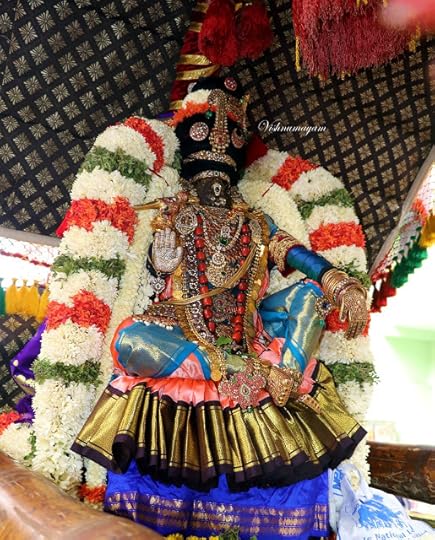
THE MIRROR
All was still and silent in Krishna’s bedchamber. The Pranava mantra that continued to resonate in the sanctum seemed to have become infrasound. The bouquet of floral odours was now barely a hint of the misty aromatic essence. The golden aura in the room looked tinted. The overwhelmed and trembling Paavai pengal, who stood by the door of the sacred chamber, stiffened—tongue-dried and scared to even tremble.
Nothing seemed to exist in that sphere any more.
That sphere where now prevailed only the still sleeping Lord Narayana and Nappinai.
And Kothai.
Kothai, who had succumbed to ego.
Kothai, who realised her mistake in the silence that followed her utterance.
Kothai, who, now flushed with shame, stood with her head bowed down.
A few drops of tears from her downcast eyes that, only moments before, had held a reflected image of Perumal and His Piratti, fell to the ground with a noiseless splat.
She closed her eyes to drain out the rest of the saltiness.
“Let them go; tears of self-pity they are,
It doesn’t do well for Perumal’s devotee
To shed tears of self-pity.
I shall cry no more now.”
Kothai, her eyes dry now, looked up at her Perumal and Piratti, at the ivory-legged bedstead upon which they lay supine. The four legs of the cot were not tusks of dead animals but the four-fold elephantine ego of a devotee that had lived in her and was dead now.
“O Madhava, from the very depths of my consciousness,
I ask You to please forgive me my folly.
O Narasimha, You who manifested, for Prahalada,
In but a brief second,
So did You, O Amalan, in Your silence, manifest for this Kothai
As awareness,
Exposing the illusion of ego and saving me from the monstrous evil.
Manifest You did as awareness, for Thou art the Formless entity,
But O Purushottama, I am but a simple village girl
Who understands not Your Formlessness,
But pines to see Your resplendent incarnation.
So, won’t You not awaken for me, my heart’s desire to fulfill?
“O Krishna, You, the epitome of valour and strength,
Who obliged the thirty three crore immortals,
Their prayers for power, position, prosperity,
Why, even fought their battles for them, O Nimalan,
Often leading from the front,
Not minding the risk,
How could this Kothai doubt
That You, the golden-hued One,
Would not come to embellish this poor devotee?
For, it is not monetary wealth that Kothai wants
But the abundance of just being close to You!
“O Narayana, You who would to the aid of a devotee
Even before they feel pain,
How brazenly mistaken can I be
To assume that You, O Nirmalan, would
This devotee’s heart break with the pain of separation?
Wake up, O my Lord Parthasarathy,
Wake up so this devotee, foolish in her love for You,
Can sing and chant the name of Hari
To her heart’s content.
Wake up please, for this Kothai,
But wake up at Your own Will.
I know You lie in pretentious ignorance of my presence,
I will entreat You no more, O Vimalan,
But bow my head in supplication to Your Will.
So saying, Kothai bowed her head yet again; this time, it was not with the flushes of shame, but with impassioned devotion. The stifled atmosphere in the chamber became breezy again. The Paavai pengal came out of the reverie that had entrapped them, heaving a sigh of relief. Their throats didn’t seem parched anymore. The Pranava mantra soothed their ears anew and their olfactory senses became alive afresh. Everything around was aglow. Everything had come back into existence.
Kothai, the palms of her hands enjoined in namaskara mudra, continued:
“O Nappinai, pardon me please my hasty accusations,
For, I know now that both my Perumal and Piratti
Vie with each other, their devotees to help.
There is not One without the other,
And none is greater than the other.
“O Mahalakshmi, bountiful is your bosom,
Rounded jars, deep and well endowed,
Isn’t that where our Perumal lives? In those depths?
Difficult it can be to bring up treasures
From a fathomless abyss,
But true devotion definitely will draw
My Madhusudhana from your chest
To liberate me.
Your luscious red lips pronounce
Postulations intense in knowledge and wisdom,
That anyone who listens will be lost in the profundity
Of your philosophies.
But even Krishna, who is always all ears for your scholarliness,
Will definitely wake up to listen
To the rustic songs of devoted village pengal.
“O Nappina with waist so slender,
Because, renounced have you all joys except the highest—
The joy of serving Him,
And detached are you from all wealth except the ultimate—
The incomparable treasure that our Hari is,
We take a leaf from your book.
O Nappinai, O Mother, please wake up
And guide us to be in the service of our Lord,
For, surrendered have we to His Will
But supplication is not inactivity,
So, wake up please and give us what we need
So we may worship Him with service."
Nappinai called out to Kothai from her resting place and told her that she was not sleeping but very much awake, and that she was thinking of ways to rouse Krishna.
“In the meantime, what may I do for you to guide you in your aspiration to serve our Lord Parthasarathy?”
“O Nappinai, give us some oil, on our head to apply,
Bathe we will in the name of our Perumal,
And when we are back, thus purified,
Give us a fan so we may cool Him in His slumber.
Give us too a mirror, not the one to admire our beauty with,
But the one that reveals to us the ahamkaras
Of my and mine,
For, isn’t that why, to acquire such a mirror,
That our Guru blessed us with the Pranava mantra?”
Om! Om! Om!
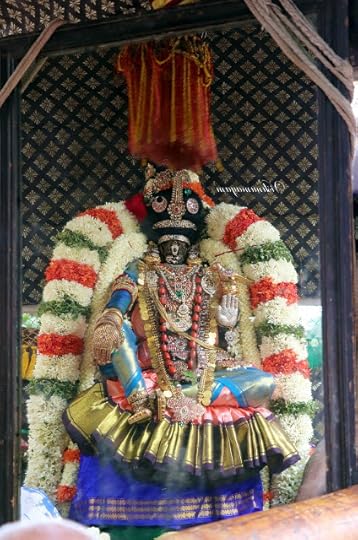
Photographs courtesy: Shankar Ramakrishnan
For more such photos, please check Facebook Page: VISHNUMAYAM
Please note: This is NOT a translation of the divine verses sung by the revered poet-saint Andal. I have not the qualifications for that undertaking, my greatest limitation being my inability to read and write Tamil. Nor can I claim to be as devoted and as passionate as Andal was to Her Rangamannar. But I do love Krishna in my own way and these verses are just my attempt at writing a poem a day, as Kothai did over the thirty days of Margazhi, centuries ago. The muse for each of these thirty verses are the thirty songs that form the thirty paasurams of Thiruppavai. As I can't read or write Tamil, I have had to look up the Internet for translations and transliterations of Thiruppavai. I have provided the links below. Also for the same reason is why my poetry is in English.
I offer this humble work at the Lotus Feet of my Lord Parthasarathy, my Krishna, my Flautist of Brindaranyam.
Click here for Thiruppavai series 2020, Day 19 of Margazhi: 03 January 2021EGO
www.facebook.com
January 4, 2021
Thiruppavai series 2020, Day 19 of Margazhi: 03 January 2021
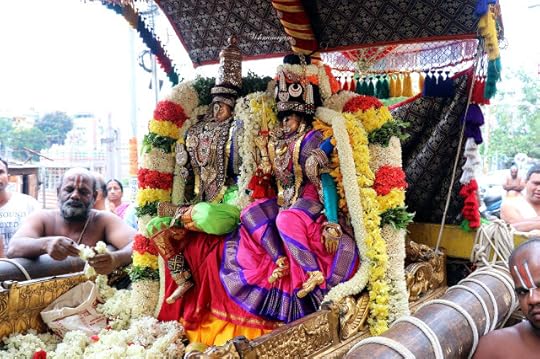
EGO
The sanctum sanctorum of Lord Narayana was, well, for lack of a better word to describe it, divine. Everything about it was incredulously divine, nay, way beyond one’s perception of incredulously divine—the lambent resplendence of un-flickering golden flames, the uncloying ambrosial headiness of moist flowers, the soft, un-droning, sonorous chants of the Pranava mantra, the euphoric warmth of unthreatening protectiveness, the delicious consciousness of unimaginable Ananda.
And in the centre of it all, lain upon an artistically carved bed with the most exquisitely soft cotton mattress, was Krishna and Nappinai drenched in the auspiciousness. Or so it seemed to the illusory senses. For, aren’t Perumal and His Piratti the source of all auspiciousness that pervades not just that chamber but the entire universe?
The Paavai pengal stood aghast, as if frozen in time, as if they could not believe their eyes. They never expected to be in this sanctity.
Along with them, but closer to the celestial bedstead, stood Kothai, equally aghast, as if frozen in time, as if she could not believe her eyes. But not for the same reason as her Thozhis. She had expected to be in this sanctity. She had always believed she would be. There never was an ounce of doubt in her about this eventuality.
But what she could not believe was the sight in front of her.
“O Narayana! Do You think this is fair?
You who had always enticed me
To come looking for You,
You, whom I thought would wait with open arms
To receive me,
Do You think this is fair of You to ignore me thus?
Here You lie, Your broad chest resting Upon Nappinai’s divine bosom,
And her lotus-like hands are upon You,
Tell me please,
Did she stop You from welcoming us,
Or did You stop her from opening the doors for us?
O Krishna! Have I not strung tulsi with my own hands
Choosing only the greenest and the freshest,
So You will have only the best garlands in the whole Universe?
Will You not open Your Eyes and regard me for that?
O Padmanabha! Gone have I from house to house,
Waking up these pengal to Your Glory,
Can You not open Your Eyes just for that
And look at me?
O Madhusudhana! These pengal have come here seeking You
Only because I beseeched them to,
Would you not reward me a glimpse evenFor bringing Your devotees to You?
O Narayana! I cannot bear separation from You
Even for a miniscule second,My pining heart is breaking,And nothing but a brief glance from YouCan heal it.Will You not alleviate it with the salve of Your sight?”
The Paavai pengal looked at Kothai with something akin to jealousy that they could not be standing so close to the Lord as she was.
Kothai looked at Nappinai with something akin to jealousy that she could not be as close to Krishna as His consort was.
“O Nappinai, is it fair that you keep Lord Narayana
Only to yourself?
You, His Piratti, enjoy nearness to Him,
You, His Piratti, share His bed with Him,
You, His Piratti, is one with Him,And we do not wish to see you otherwise,
Yet, even for a second do you not want to be parted from the Lord
So He may shower His Grace upon us with just a look
And grant us moksham with just a word from His Lips!
O Nappinai, we came hither to behold the charm
In your collyrium-lined eyes—
The blackness of our Lord Parthasarathy, the collyrium—
But you allure Him with those very eyes,
Holding His gaze within them.
Oh, how could you?
O Nappinai, your lips of rosy redness—The redness of His Heart, fragrant as a flower—
We desired that ruddiness to cast a smile towards us,But you enchant our Mukunda with themAnd He doesn’t want to bestow upon us even a Word.
O Nappinai, Hari is the only Purusha,
All else is stree,
You as Prakriti is the quintessence of empathy,
What makes you do this to us simple village girls?
This ego is not becoming of you,
Please allow Him to wake up
So we Paavai pengal who are fasting for His blessing,May soon find liberation.”
But Perumal and Piratti, nonchalant their stance, made no move but lay as recumbent as before.
What is ego? What is egolessness? It’s the same as illusion and reality. One is not the other, the other is not the one. Yet we err.
There is only one reality: Lord Narayana.
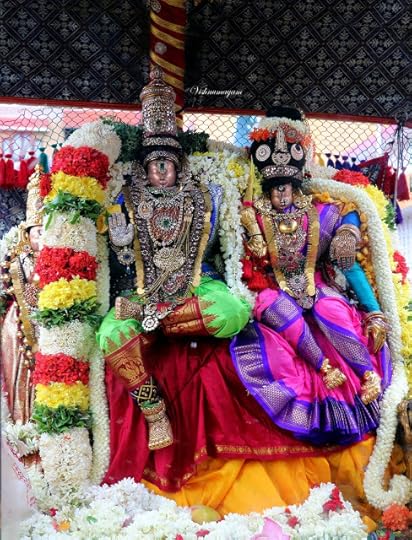
Photographs courtesy: Shankar Ramakrishnan
For more such photos, please check Facebook Page: VISHNUMAYAM
Please note: This is NOT a translation of the divine verses sung by the revered poet-saint Andal. I have not the qualifications for that undertaking, my greatest limitation being my inability to read and write Tamil. Nor can I claim to be as devoted and as passionate as Andal was to Her Rangamannar. But I do love Krishna in my own way and these verses are just my attempt at writing a poem a day, as Kothai did over the thirty days of Margazhi, centuries ago. The muse for each of these thirty verses are the thirty songs that form the thirty paasurams of Thiruppavai. As I can't read or write Tamil, I have had to look up the Internet for translations and transliterations of Thiruppavai. I have provided the links below. Also for the same reason is why my poetry is in English.
I offer this humble work at the Lotus Feet of my Lord Parthasarathy, my Krishna, my Flautist of Brindaranyam.
Click here for Thiruppavai series 2020, Day 18 of Margazhi: 02 January 2021THE CONSORT
www.facebook.com
January 2, 2021
Thiruppavai series 2020, Day 18 of Margazhi: 02 January 2021
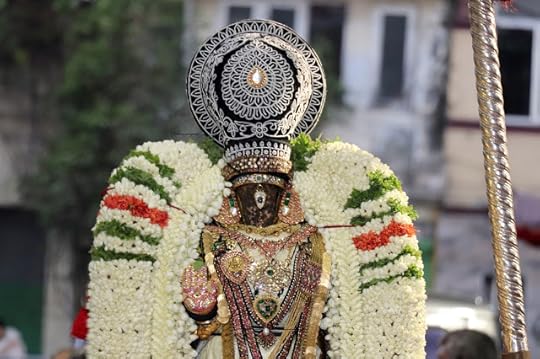
THE CONSORT
A wide-awake Balarama directed the Aayapaadi girls into a secret chamber that looked like an extremely spacious, well-lit passageway. At the far end of the passage was a door.
“You will find Krishna here,” said Balarama, and left.
Kothai and the Pengal stood at the entrance, dazed and confounded. There was something very sacred, something very pristine about the atmosphere in that chamber; a certain peace and joy they had never experienced before. It was as if they were violating that calm by their very presence, as if they had no right to be there.
But they also knew that they could not turn back now. So they moved forward with the same determination they had had when they had set out from Aayapadi a few hours ago. Was it only a few hours ago that they had set out? It was difficult to believe, for, so much had happened since early dawn, so much transformation.
Hard to believe it is, O my Krishna,
For such was the path
You made us walk upon, step after step
Of divine graciousness.
Destined we were to tread that path,
Come all the way, wherefrom there is no going back.
And why would we now, O my Krishna
When we know that just beyond that door yonder
Is Your sanctum sanctorum
Where, waiting You will be for us
With open arms!
This thought took Kothai forward. Her Thozhis followed her. The girls were still chanting His Name for every step they took, but it was in the silence of their hearts they pronounced His Name. Their handwoven sarees seemed to have voluntarily diminished their brightness to merge with the calm. They swished no more, the jimikis danced no more, and their anklets dared not to squeal, so overpowering were the divine vibrations.
Reached we have, my Thozhis,
The door that separates us from our Krishna,
A simple door this, with no paraphernalia
Except for this elephant-headed brass knocker.
Could this be the head of Kuvalayapida,
The elephantine ego that He subdued?
O my Thozhis, tell me please…
Shall we use this knocker to let Him know
Of our waiting here, outside His chambers,
So He would let us into His presence?
Or, shall we just burst into the song
We have been practising to sing before Him,
So to awaken Him?
He would know the song, of course, the Maayan that He is,
I know would have been hiding behind bushes
To listen to our practising.
But the Paavai pengal had no answer to give to Kothai. They were all dumbstruck.
O Krishna, what play is this?
Why are You not at Your door, waiting?
Is this indeed the door to Your sanctum?
It has to be, for Balarama is not You to play tricks
Upon naive village girls.
Are you in there, O Krishna
Or is there someone else we must pray to?
Confused, Kothai invoked the Guru Tattwa. The ever-empathetic Nandagopan came to her aid.
“My daughter-in-law, Nappinai, is inside with my Son. Call out to her, wake her up. She will take you to Him.”
So Kothai sang thus:
O Nappinai, Mahalakshmi, you whom our Lord Narayana
Keeps close to His Heart,
Wake up please!
You whom our Krishna won over
By overpowering seven bulls,
Wake up please!
You who are the moon to the solar effulgence
Of our Lord Parthasarathy,
Wake up please!
You who are Prakriti to the One and only Purusha,
Wake up please!
O Nappinai, in waking you,
I wake up the prakriti in me,
Forgotten have we humans that we too
Are creatures of the earth.
Wake up we must
The rooster in us, and believe like the crowned bird
That everyday brings a new dawn of hope.
Wake up we must
The koel’s song upon our lips that fills depressed hearts
Not with hurt but with melodies enriching.
Wake up we must
The freedom of a bird that chirps with exhilaration,
And with wings spread out, soars skyward with abandon.
Wake up we must
The might of an elephant so that we run away not
From life’s battles but face them instead
With the strength of wisdom.
Wake up we must
The joy of giving
Like the perennial maadhavi flower,
Our fragrance unasked, unbiased.
O Nappinai, the world is a fecund ball in your hands
For you to play with,
And in waking you, I awaken nature within me —
The stability of earth,
The flow of water,
The spirit of fire,
The potency of sound,
The generosity of space.
Wake up, O Nappinai,
We pray to you to rise from your repose,
Take dainty steps towards the door
And with your hands so soft and red like the lotus,
Open the doors for us to the jingle of the bangles
You wear on your wrists.
Nappinai, who was lying beside her Lord Narayana, did not want to leave His side even for a second. She told the girls that the door was not bolted and that they could come in.
Kothai and her Thozhis looked at each other. Their moment had come, the moment of reward for their diligent efforts. There was now but just one door that separated them from their Krishna, and all they had to do was to open that door and walk in, and lo! their Ranga would be waiting for them, His eyes glued to the door, as eager to see them as they were longing to see Him.
Pushing the door open noiselessly, the girls walked into the room in all reverence. There they were at last, in the sanctum sanctorum of their beloved Lord Narayana. The room was lit with soft lamps that cast a welcoming golden glow all over, surprisingly with no shadows.
Nappinai, an epitome of beauty and grace, was lain upon the divine cushiony bed, from where she smiled at Kothai and the girls, her collyrium-lined eyes joining her red lips in the greeting. Her long, thick tresses that cascaded from the bed to the floor were neatly plaited and studded with pearl ornaments and jasmine, the flowers rendering an aura of pleasantly mesmerising fragrance that hung heavily in the air, giving Kothai and her pengal a heady feeling.
And, as if dazed by the perfume, and probably the ravishing charm of Nappinai, lay Madhusudhana next to His Mahalakshmi, His eyes closed, unaware of the arrival of Kothai and her Thozhis.
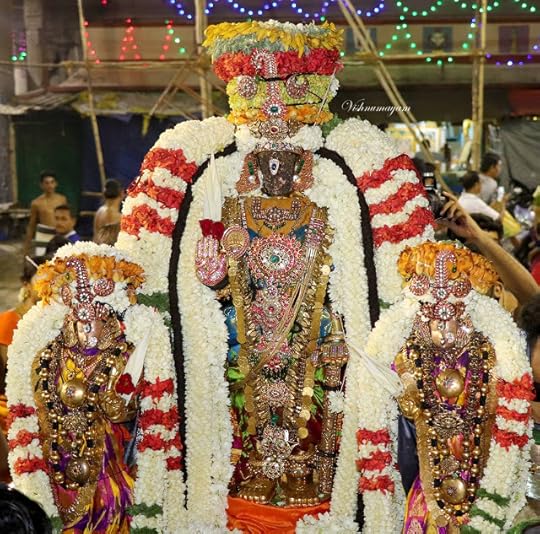
Photographs courtesy: Shankar Ramakrishnan
For more such photos, please check Facebook Page: VISHNUMAYAM
Please note: This is NOT a translation of the divine verses sung by the revered poet-saint Andal. I have not the qualifications for that undertaking, my greatest limitation being my inability to read and write Tamil. Nor can I claim to be as devoted and as passionate as Andal was to Her Rangamannar. But I do love Krishna in my own way and these verses are just my attempt at writing a poem a day, as Kothai did over the thirty days of Margazhi, centuries ago. The muse for each of these thirty verses are the thirty songs that form the thirty paasurams of Thiruppavai. As I can't read or write Tamil, I have had to look up the Internet for translations and transliterations of Thiruppavai. I have provided the links below. Also for the same reason is why my poetry is in English.
I offer this humble work at the Lotus Feet of my Lord Parthasarathy, my Krishna, my Flautist of Brindaranyam.
Click here for Thiruppavai series 2020, Day 17 of Margazhi: 01 January 2021THE MANTRA
www.facebook.com



